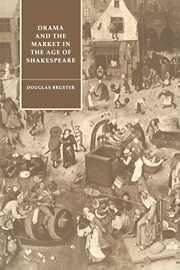Book contents
- Frontmatter
- Contents
- Preface
- Acknowledgments
- A note on texts
- 1 Toward a material theater
- 2 Drama and the age
- 3 “City comedy” and the materialist vision
- 4 Horns of plenty: cuckoldry and capital
- 5 The objects of farce: identity and commodity, Elizabethan to Jacobean
- 6 The farce of objects: Othello to Bartholomew Fair
- 7 “The alteration of men”: Troilus and Cressida, Troynovant, and trade
- Notes
- References
- Index
7 - “The alteration of men”: Troilus and Cressida, Troynovant, and trade
Published online by Cambridge University Press: 11 September 2009
- Frontmatter
- Contents
- Preface
- Acknowledgments
- A note on texts
- 1 Toward a material theater
- 2 Drama and the age
- 3 “City comedy” and the materialist vision
- 4 Horns of plenty: cuckoldry and capital
- 5 The objects of farce: identity and commodity, Elizabethan to Jacobean
- 6 The farce of objects: Othello to Bartholomew Fair
- 7 “The alteration of men”: Troilus and Cressida, Troynovant, and trade
- Notes
- References
- Index
Summary
I have an excellent thought: if some fifty of the Grecians that were crammed in the horse belly had eaten garlic, do you not think the Trojans might have smelt out their knavery?
Sly, in Webster's Induction to The Malcontent (1604)We are so asotted with these delights, so blinded with the love, and drunken with the sweetness of these vanities, that greedily we flock together, and with our brainsick assemblies not unlike to the Troyans hale in the horse, whose bowels have been many times gaged with the sword of his truth …
Stephen Gosson on London's playhouses, in Plays Confuted (1582)When, in Twelfth Night (1601), one coin already well in hand, Feste begs another of Viola, he applies a commercial gloss to the Troilus and Cressida legend:
FESTE. Would not a pair of these have bred, sir?
VIOLA. Yes, being kept together, and put to use.
FESTE. I would play Lord Pandarus of Phrygia, sir, to bring a Cressida to this Troilus.
VIOLA. I understand you, sir. 'Tis well begg'd.
FESTE. The matter, I hope, is not great, sir – begging but a beggar:
Cressida was a beggar.
(3.1.49–55)In personifying the two coins – the one as Troilus, the other Cressida – and endowing them with desires and traits of their own, Feste participates in what I have described in the preceding pages as the tendency of Elizabethan and Jacobean drama to objectify the personal.
- Type
- Chapter
- Information
- Drama and the Market in the Age of Shakespeare , pp. 97 - 117Publisher: Cambridge University PressPrint publication year: 1992



